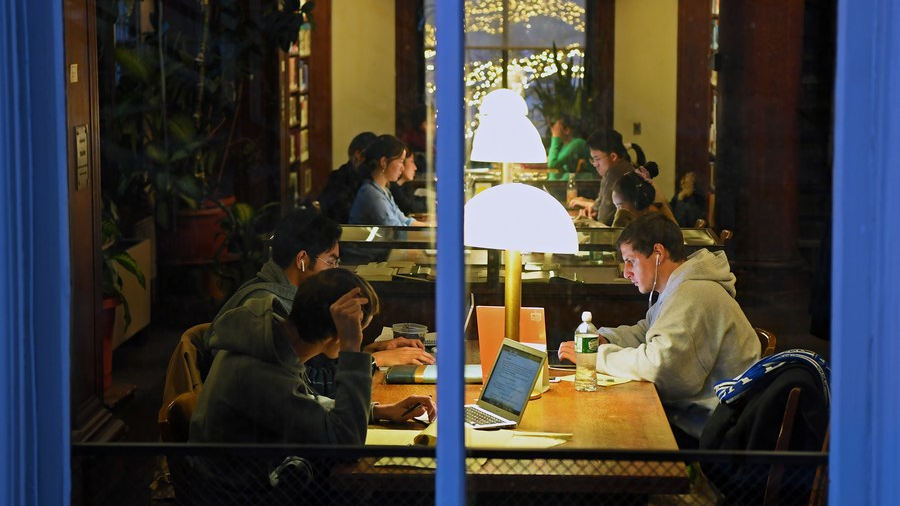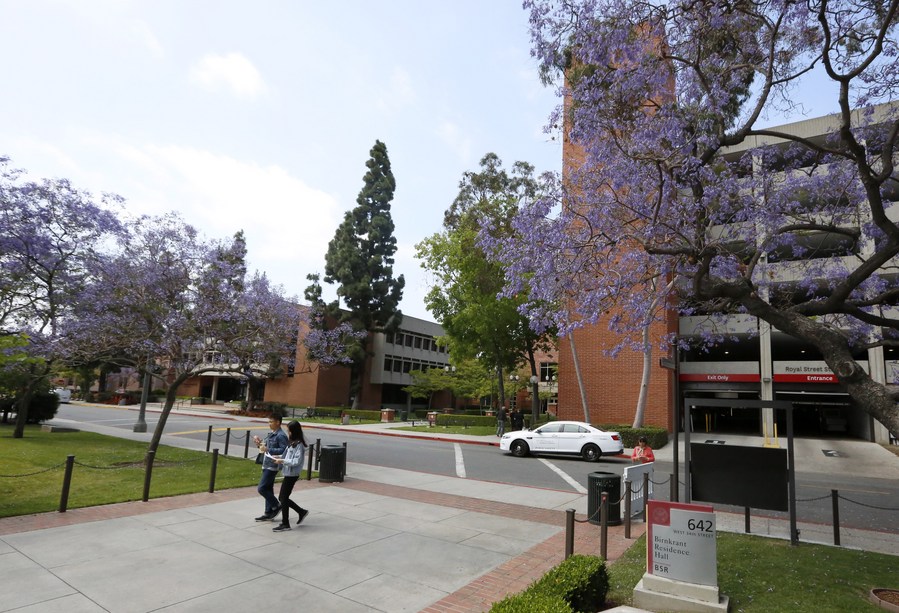
Students study at a library of Columbia University in New York, the United States, December 7, 2019. /Xinhua
Students study at a library of Columbia University in New York, the United States, December 7, 2019. /Xinhua
Editor's note: Kong Qingjiang is the dean of the School of International Law, China University of Political Science and Law. The article reflects the author's opinions, and not necessarily views of CGTN.
With the coronavirus still spreading across the world, U.S. universities have been forced to reckon with switching to online classes. After elite colleges like Harvard and Yale announced plans to conduct the majority of classes online this coming year, the U.S. Immigration and Customs Enforcement (ICE) stirred panic and confusion by announcing a policy that would block international students from coming to the U.S.
International students who are based in the United States for online courses will have to leave the country or risk deportation and students who are bound for the U.S. to study will not be permitted to enter the country if their universities are only offering online courses.
Needless to say, both international students and their universities will be affected by the new immigration policy. Students' plans will be disturbed. For the universities, they will suffer at least loss of tuition and even prospective students.
It is known to all that international students are mutually beneficial to students and the United States. For the latter, international students can in the long run serve as the relatively high-quality talent needed by the U.S., and in the short term, provide a considerable portion of funding to U.S. universities through tuition fees and enhance the diversity and vitality of the academic community.
From this perspective, the visa restriction that forces international students to leave is an act that harms the interests of international students, and those of U.S. universities, and even causes damage to U.S. scientific leadership.
Therefore, a question arises: What's behind the new immigration policy?
It is widely believed, though not confirmed, that imposing such a visa restriction upon international students is part of the Trump administration's overall plan to reopen the country amid the COVID-19 pandemic. The importance of reopening is critical to both economic recovery as well as in the interest of his political supporters.
However, according to the law of the United States, public health and related issues are within the jurisdiction of the states. Most states with Democratic governors are not willing to cooperate as the pandemic has not been curbed. So the reopening plan has not gone as expected.

Two students walk on the campus of the University of Southern California in Los Angeles, California, the United States, June 3, 2019. /Xinhua
Two students walk on the campus of the University of Southern California in Los Angeles, California, the United States, June 3, 2019. /Xinhua
For Donald Trump, fortunately, issues like visa and border control are within the province of the federal government. Therefore, he certainly would not waste this opportunity to promote his reopening plan in the field of visa policy for international students.
Now a further question occurs: Is the new immigration policy lawful?
The federal district court that accepted the first case, which was brought by Harvard University and Massachusetts Institute of Technology (MIT), will render its judgment soon concerning whether the visa restriction is lawful or not. Therefore it is inappropriate to comment on the legality of the restriction from the U.S. law point of view.
Nevertheless, it is helpful to perceive this issue from the international law point of view. Indeed, a country is in a position to decide whether to issue visa to foreign nationals whether to allow them to enter the country, particularly where they carry an infectious disease. However, for those foreign nationals that hold legally obtained visa or permit to stay, the county shall refrain from forcing them to leave unless they have committed crimes or other illegal acts. In that sense, the legality of the new visa restriction is questionable from the international law point of view.
Amid the confusion and panic, several famous universities in the United States including Harvard and MIT have resorted to the law. Many universities have participated in the litigation through the amicus curiae, which literally means the "friend of the court," and requested the court to rescind the policy. The amicus curiae here refers to a system that allows interested parties other than litigants to submit written opinions for the reference of judges who hear the case.
In fact, with the further fermentation of the new immigration policy, more universities and other interested parties may also bring lawsuit or participate in the lawsuit in the form of amicus curiae. In fact, the public university system of California, which is composed of 10 public universities, and the University of Southern California, have also successively stated that they will take legal means to challenge the visa restriction.
For international students who are to be seriously affected by the visa restriction, they have at least three choices: firstly, since a few universities have filed litigation to challenge the legality of the visa restriction, they can stand by the universities because their interests are in a way in line with those of universities. In this regard, they may even take advantage of the legal system of amicus curiae by submitting their opinions to the court to have their voice heard as an interested third party other than a litigant.
Secondly, they certainly can request legal aid from their universities or assistance of consular services or even take legal action.
Thirdly, they can consider relocating themselves to other countries that are more friendly to foreign students.
(If you want to contribute and have specific expertise, please contact us at opinions@cgtn.com.)